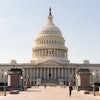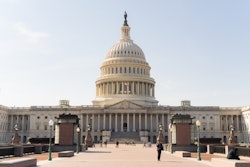Black scholars and policy leaders gathered on Thursday to discuss the impact that the end of affirmative action may bring to Black colleges and Black students at large. The virtual panel, convened by the Center for Policy Analysis and Research, explored the growing concerns surrounding the end of race-conscious admissions in colleges and universities and what these policy changes will mean for campuses nationwide.
“I would describe it as a nationwide attack on public education and on public school educators,” said Danielle Davis, staff counsel for the National Education Association, one of the country's largest teacher unions. “Who are working hard every day to ensure that all students, regardless of their color, have access to public education that's honest, that's inclusive. But we've seen this groundswell of law and policymakers who are doing the opposite.”
The webinar was hosted by the Congressional Black Caucus Foundation.  Dr. Ivory A. Toldson
Dr. Ivory A. Toldson
“I have not come across a campus yet, and particularly not my own, that hasn't said that this removes a tool, but the goal is the same,” said Dr. Kimberly Griffin, dean of education for the University of Maryland, adding that the university remains committed to promoting equity and justice. "And this removes a tool from our toolbox to reach those goals.”
The landmark decision has made it unlawful for colleges to take race into consideration as a specific factor in admissions at a time when many colleges are attempting to increase the diversity on their campuses.
“It's going to hurt the schools more than it's going to hurt Black People, to be quite honest,” said Dr. Ivory A. Toldson, a professor at Howard University and the director of research for the NAACP, the nation's oldest civil rights organization. For Toldson, it’s important to take into account the enrollment incline that higher education saw while millennials were college-age. But things have changed. “Now we're seeing an enrollment cliff. And so, there's a lot of institutions that have already started to try to increase their diversity efforts because they need a larger enrollment there. There's a greater competition for students,” he said.
Universities and colleges throughout the nation has made it a mission to create a more inclusive space for marginalized students. Schools such as the University of Oregon has created and funded Black residence halls such as the DeNorval Unthank Jr. Hall to help with enrollment and to provide a safer campus and increase enrollment of Black students in their campus.
For Griffin, historically white institutions should take the time to learn from HBCUs on what it means to really center a student, particularly a marginalized student on their campus. In her eyes, if the mission of an institution is to include these students and their education and experiences on campus, then everybody will benefit from the resources that are generated from trying to reach that goal.
According to the National Center for Educational Statistics, HBCUs saw an increase of enrollment during the pandemic. Morgan State University in Baltimore, for example, reported a 58% increase in undergraduate applications in 2021 compared to 2019.
But as many institutions attempt to navigate around the supreme court decisions, the recent decisions have created reason to be alarm.
"There's a weaponization of the courts, but in addition to that, you see some very overzealous state legislatures, said Lodriguez Murray, Senior Vice President of Public Policy and Government for the United Negro College Fund (UNCF). "There's a trend where we often pay attention to very national big headline things that you can find as you scroll through Instagram. However, where our attention also needs to be, is at the state and the local level to make sure those leaders are not doing the things that we don't want.”
Despite concerns about the court's recent decision, panelists expressed an eager message to all students and their families who are worried about college enrollment.
“Apply anyway. Apply widely,” said Griffin., adding that any institutions remain committed to creating diverse places for students to live and study.
















